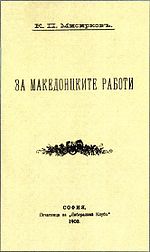- Macedonian Onomastics
-
Macedonian language

- Macedonian language
- Macedonistics
- Sign language
- Standard Macedonian
- Spoken Macedonian
- Naming dispute
- Political views
- Geographical distribution
- Regulatory body
- History
- Literature
- Dialects
- Grammar
- Macedonian lexicon
- Orthography
The Macedonian Onomastics (Macedonian: Македонска ономастика, makedonska onomastika) is part of the Macedonistics that studies the names, surnames and nicknames of the Macedonian language. This is relatively new linguistic discipline. In Macedonia, and in the Macedonistics in general, it developed during the 19th century, where the first few research results have been provided. The Onomastics for a long period of time has been considered as part of various scientific disciplines, such as Geography, History or Ethnography, until it became a discipline on its own in the 20th century. The Macedonian Onomastics, generally speaking, is divided into toponomastics and anthroponomastics.[1]
Contents
Division
The Onomastics is divided into two large categories, which in turn include several different subcategories or disciplines. The two basic categories of the Macedonian Onomastics are:[2]:
- Toponomastics
- Anthroponomastics
Toponomastics
The toponomastics is a branch of the Onomastics that studies the toponymies, or in other words the names of the places, geographical terms, their meaning and origin. Depending on the nature of the toponymy, it can be divided into the following subcategories[1]:
- Hydronomastics, a scientific discipline that studies the names of the water bodies. Some hydronyms are: Vardar, Treska, Crna Reka, Ohrid Lake etc.
- Oronomastics, a scientific discipline that studies the names of the mountains, hills, plains, valleys, picks, field and other geographic components. Some examples of the Macedonian oronymies are: Šar Mountains, Polog, Pelagonia, Osogovo etc.
- Onomastics of places, a scientific discipline that studies the names of the settlements, towns, villages, cities. Some examples are: Tetovo, Kumanovo, Skopje, Konče, Medžitlija etc.
The Toponomastics for its researches uses the toponomastic stratigraphy. The research of the toponymies is done via analysis of the different names of one particular item. The names are direct consequence of the different people, languages and cultures that existed on that particular area. The main principle that is taken intro account is the fact that even though the languages and people that lived in that area disappeared (via migration or assimilation), the names of the places, their meanings and origin remain. Those names later on will be acquired by the new people that came to that area and they will become part of their active lexicon.[2]
Anthroponomastics
The Anthroponomastics is the second large discipline of the Onomastics. The Anthroponomastics studies the meaning and origin of the personal names. Moreover, it deals with:[2]
- Personal names. The origin of the Macedonian names varies. Most of them are of Macedonian Slavic origin, but there are popular names of foreign origin as well. Some names can be simple, such as Драги (Dragi), and some can be complex, such as Драгомир (Dragomir). The names are given according to people's will, way of living and the conditions where people live. They are quite important in the Macedonian society since they serve as an identification and they are basis for development of the Macedonian surnames and nicknames.
- Many personal names unique to Macedonian were historically hypocorisms: ex. Гоце (Goce) (for Георгија (Georgija) and variants) which is now a name in its own right, while others have remained hypocorisms such as Зоки (Zoki) for Зоран (Zoran).
- Surnames. The surnames in Macedonian are predominantly made by adding the possessive suffix -ов (-ov) or -ев (-ev), usually with an additional possessive suffix -ски (-ski) to a personal name, title, occupation, etc. Elision is common in Spoken Macedonian and this has resulted in forms such as -оски (-oski) and -ески (-eski). An example is the surname Милевски (Milevski) which is made up of the personal name Mile and the possessive suffixes -ев (-ev) and -ски (-ski). There are some surnames without suffixes such as Темелко (Temelko), Насто (Nasto), Митре (Mitre), Никола (Nikola), Ристо (Risto), Терпо (Terpo) and Трајко (Trajko) among the Macedonians of Albania. There are also some names whose etymology is unknown. Female surnames mirror those for men, but inflect for grammatical gender: -ова (-ova), -евa (-eva), -ска (-ska). Consequently, the feminine form of the surname Milevski is Milevska (elided forms would be Mileski and Mileska, respectively).
- Nicknames. In Macedonian, usually, the nickname is given according to some physical characteristic of the person, but also they can reflect person's profession, personal characteristics, mental capabilities or disabilities. Some Macedonian nicknames are: буцко (bucko), зборко (zborko), женкар (ženkar) and many others.
References
- ^ a b Бојковска, Стојка; Лилјана Минова - Ѓуркова, Димитар Пандев, Живко Цветковски (декември 2008). Саветка Димитрова. ed (in Macedonian). Општа граматика на македонскиот јазик. Скопје: АД Просветно Дело. ISBN 978-9989-0-0662-7.
- ^ a b c Стојка Бојковска, Димитар Пандев, Лилјана Минова - Ѓуркова, Живко Цветковски (2001) (in Macedonian). Македонски јазик за средно образование. Скопје: Просветно Дело АД. pp. 254–256.
Related
External links
- The Macedonian language and onomastics in a great Slavic encyclopaedia at dnevnik.com in Macedonian.
Categories:- Macedonian grammar
- Macedonian language
- Onomastics
- Macedonian-language surnames
- Macedonian language
Wikimedia Foundation. 2010.

